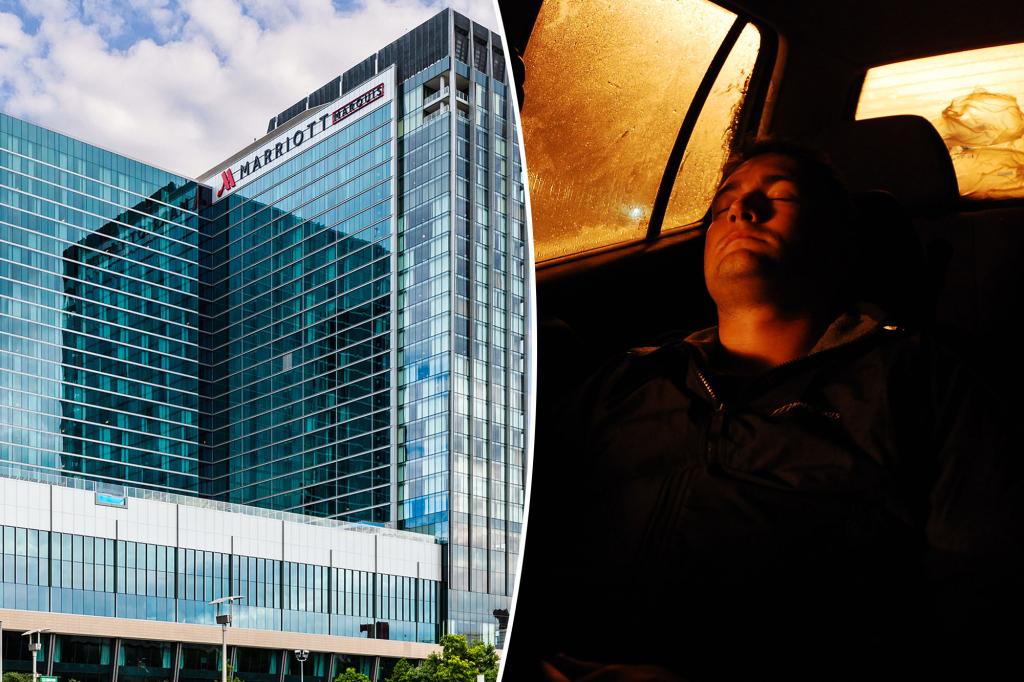Left High and Dry in Sin City: A Family’s Marriott Nightmare
A family vacation turned into a parking lot nightmare when a father, along with his wife and 3-year-old child, were forced to spend a sweltering Las Vegas night sleeping in their car after the new Element & AC Hotel Symphony Park refused to honor their reservation. The reason? The father had misplaced his physical credit card, despite being a Marriott Bonvoy Titanium Elite member. While his toddler curled up in the back seat and his wife tried to sleep in the passenger seat, the desperate dad repeatedly sought help through every official Marriott channel, all to no avail. The situation was especially frustrating because Marriott actively promotes “digital check-in” as a convenient feature allowing guests to bypass the front desk—yet when this family needed it most, this supposed perk transformed into an uncomfortable night under the desert stars.
When confronted about the incident, the hotel’s response felt cold and corporate. The general manager sent what appeared to be a scripted apology: “I do apologize for not being able to check you in without a physical credit card being present… At our property we do require a matching ID and credit card be run through our chip & pin machine.” When the father escalated his complaint to corporate headquarters, Marriott doubled down, stating the Vegas hotel was “within its rights” to demand a physical card and ID. Remarkably, they simultaneously acknowledged an “inconsistency between the advertised amenities and the operational practices” regarding their much-hyped Digital and Mobile Check-In feature. Despite this admission, the company offered no solution—only noting that the father’s observations had been “shared with our internal teams for further evaluation,” a response that did little to address the family’s ordeal.
The frustrated guest didn’t hold back in his response, accusing Marriott of engaging in deceptive trade practices. “When a company continues to promote a specific feature as an inducement to purchase, knowing it will not be delivered, the question ceases to be one of internal policy and becomes one of deceptive trade practice,” he argued. His point cut to the heart of consumer protection laws—if a company advertises a service that influences purchasing decisions but consistently fails to deliver that service, customers are being misled. The father wasn’t demanding Marriott completely overhaul their check-in process; he simply wanted honesty in their marketing. A straightforward edit to the property’s amenity list—either removing “Digital Check-In” or clearly stating that a physical card is always required—would resolve the inconsistency and protect both guests and Marriott from potential regulatory scrutiny.
The family’s experience points to a broader disconnect between the hospitality industry’s digital marketing promises and the reality guests face when checking in. Marriott promotes its digital features extensively, suggesting a seamless, cardless experience for tech-savvy travelers. Yet when this family arrived, tired after their journey and ready to settle into their reserved room, they encountered a rigid policy that the hotel staff refused to work around. What makes this particularly puzzling is that the guest was a Titanium Elite member—representing the upper echelon of Marriott’s loyalty program—yet this status apparently earned him no flexibility or consideration during his moment of need. Instead of finding a solution for a loyal customer with a valid reservation and digital payment information, the hotel chose strict adherence to policy over hospitality, leaving a young family to spend the night in their vehicle during hot Las Vegas weather.
This incident isn’t isolated in the hospitality industry’s evolving relationship with guests. Travelers worldwide have reported increasing frustration with hotels finding new ways to extract additional revenue and enforcing policies that seem at odds with the concept of hospitality. Screenshots have circulated showing third-party booking sites presenting tipping requests before guests have even checked out. The traditional practice of discretely slipping $20 to the front desk for an upgrade has been replaced at some establishments with more direct approaches—some luxury hotels now present tipping suggestions immediately upon check-in. One traveler reported being “given a slip of paper pushing tipping along with their key” at the Marriott LaSalle in Bryan, Texas. Another guest who had felt “smugly happy” about avoiding Marriott properties discovered the same practice at Boston’s Hyatt Centric Faneuil Hall, suggesting this trend extends beyond a single hotel chain.
The Las Vegas family’s ordeal highlights the growing tension between digitization, customer service, and corporate policies in the hospitality industry. While hotels invest heavily in promoting digital conveniences like mobile check-in, mobile keys, and app-based room selection, the reality often falls short of these glossy promises. For this family, the gap between marketing and reality meant a night of discomfort and stress rather than the restful hotel stay they had reserved and rightfully expected. Their experience serves as a cautionary tale for travelers and a challenge to hotel chains: either deliver on the digital conveniences you advertise or be transparent about the limitations and requirements that remain in place. As the disappointed father pointed out, this isn’t just about customer satisfaction—it’s about truth in advertising and the fundamental trust between businesses and consumers that forms the foundation of the hospitality industry. When a hotel chain leaves a loyal member and his young family sleeping in a car on a hot night despite having a valid reservation, it raises serious questions about priorities and practices that extend far beyond a single unfortunate incident.


